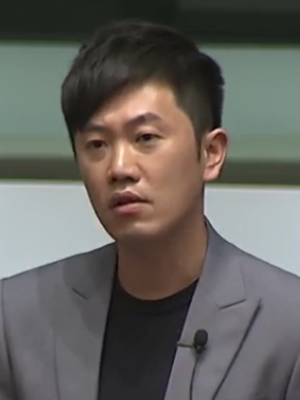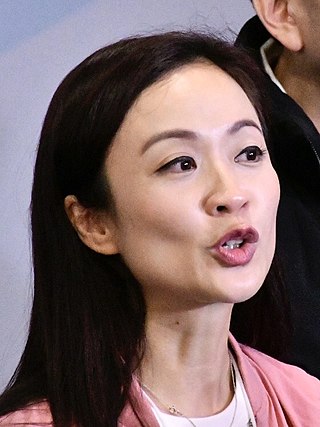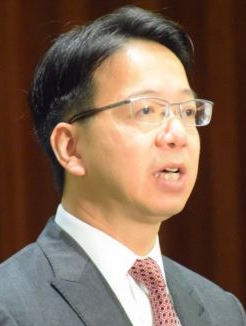
Leung Kwok-hung, also known by his nickname "Long Hair" (長毛), is a Hong Kong politician and social activist. He was a member of the Legislative Council, representing the New Territories East. A Trotskyist in his youth, he was a founding member of the Revolutionary Marxist League. He became a political icon with his long hair and Che Guevara T-shirt in the protests before he was elected to the Legislative Council in 2004. In 2006, he co-founded a social democratic party, the League of Social Democrats (LSD) of which he was the chairman from 2012 to 2016.

The Kowloon West geographical constituency was one of the five geographical constituencies of the Legislative Council of Hong Kong from 1998 to 2021. It was established in 1998 for the first SAR Legislative Council election and was abolished under the 2021 overhaul of the Hong Kong electoral system. In the 2016 Legislative Council election, it elected six members of the Legislative Council using the Hare quota of party-list proportional representation. It had 602,733 registered electorates in 2020. The constituency corresponded to the districts of Yau Tsim Mong, Sham Shui Po, and Kowloon City.

The New Territories East geographical constituency was one of the five geographical constituencies in the Legislative Council of Hong Kong. It was established in 1998 for the first SAR Legislative Council election and was abolished under the 2021 overhaul of the Hong Kong electoral system. It encompassed Sha Tin District, Tai Po District, North District and Sai Kung District. In the 2016 Legislative Council election, nine members of the Legislative Council using the Hare quota of party-list proportional representation with 1,139,616 electorates in 2020.

The pro-democracy camp, also known as the pan-democracy camp, is a political alignment in Hong Kong that supports increased democracy, namely the universal suffrage of the Chief Executive and the Legislative Council as given by the Basic Law under the "One Country, Two Systems" framework.

The League of Social Democrats (LSD) is a social democratic party in Hong Kong. Chaired by Chan Po-ying, wife of Leung Kwok-hung, it positions itself as the radical wing of the pro-democracy camp and stresses on "street actions" and "parliamentary struggles".

The Fifth Legislative Council of Hong Kong was the fifth meeting of the legislative branch of the Hong Kong Special Administrative Region Government. The membership of the LegCo is based on the 2012 election. The term of the session is from 1 October 2012 to 30 September 2016, during the term in office of the Chief Executive Leung Chun-ying. Due to the new arrangements agreed in a contentious LegCo vote in 2010, the session consists of the new total of 70 seats in LegCo, ten more than previously, with 35 members elected in geographical constituencies through direct elections, and 35 members in functional constituencies, in which five District Council (Second) functional constituency seats each represent all 18 District councils of Hong Kong voted for by all resident voters in Hong Kong. The Democratic Alliance for the Betterment and Progress of Hong Kong remained the largest party while the pan-democrats secured the one-third crucial minority. Notable new members of the LegCo members include Gary Fan from the new established party Neo Democrats and first openly gay councillor, People Power's Ray Chan Chi-chuen.

The 2016 Hong Kong Legislative Council election was held on 4 September 2016 for the 6th Legislative Council of Hong Kong (LegCo). A total of 70 members, 35 from geographical constituencies (GCs) and 35 from functional constituencies (FCs), were returned. The election came after the rejection of the 2016/2017 constitutional reform proposals which suggested the electoral method for the 2016 Legislative Council remains unchanged.

The 2015 Hong Kong District Council elections were held on 22 November 2015. Elections were held to all 18 District Councils with returning 431 members from directly elected constituencies after all appointed seats had been abolished.

Localist camp or localist and self-determination groups refers to the various groups with localist ideologies in Hong Kong. It emerged from post-80s social movements in the late 2000s which centred on the preservation of the city's autonomy and local lifestyles and opposed the perceived growing encroachment of the Chinese government on the city's management of its own political, economic, and social affairs.

The People Power–League of Social Democrats, are two radical democratic parties that set up an electoral alliance for the 2016 Hong Kong Legislative Council election under the name "progressive democrats". It fielded a total of nine candidates to contest Legislative Council seats in the five geographical constituencies, in which two of the three incumbents were returned.

The Sixth Legislative Council of Hong Kong was the sixth meeting of the legislative branch of the Hong Kong Special Administrative Region Government. Running from 1 October 2016 to 31 December 2021, it was the longest legislative session in Hong Kong history, lasted for five years and three months. The term of the session was originally from 1 October 2016 to 30 September 2020, but was extended by the National People's Congress Standing Committee (NPCSC) due to the postponement of the 2020 Legislative Council election.

Lau Siu-lai is a Hong Kong educator, academic, activist, and politician. She is a sociology lecturer at the Hong Kong Polytechnic University's Hong Kong Community College and the founder of Democracy Groundwork and Age of Resistance. In 2016, Lau was elected to the Legislative Council, representing the Kowloon West geographical constituency until she was disqualified by the court on 14 July 2017 over her oath-taking manner at the inaugural meeting of the Legislative Council on 12 October 2016.

Cheng Chung-tai is a Hong Kong academic, social activist, and politician. After winning a seat in the New Territories West constituency in the 2016 legislative election, he took over from Wong Yeung-tat as chairman of Civic Passion until the dissolution in 2021.

Edward Yiu Chung-yim is a Hong Kong academic, scholar and former politician who is currently an associate professor of property at the University of Auckland Business School. He is a former member of the Legislative Council of Hong Kong elected in the 2016 Legislative Council election representing the functional constituency of Architectural, Surveying, Planning and Landscape. On 14 July 2017, Yiu was disqualified by the court over his manner on oath of office at the inaugural meeting of the Legislative Council on 12 October 2016 as a result of the oath-taking controversy.
The Hong Kong Legislative Council members' oath-taking controversy was a series of events surrounding the oaths of office of a dozen pro-democracy and localist camp members-elect of the Legislative Council of Hong Kong (LegCo) on 12 October 2016 which have resulted in the disqualification of six members, Sixtus "Baggio" Leung and Yau Wai-ching of Youngspiration, who were unseated by the court on 15 November 2016, and Leung Kwok-hung, Nathan Law, Yiu Chung-yim and Lau Siu-lai on 14 July 2017.

The 2018 Kowloon West by-election was held on 25 November 2018 after the incumbent pro-democracy Legislative Councillor Lau Siu-lai of Kowloon West was disqualified from the Legislative Council of Hong Kong (LegCo) after the oath-taking controversy resulted in the disqualifications of the six pro-democracy and localist legislators. It followed the by-election of four other vacated seats on 11 March 2018. Chan Hoi-yan, a nonpartisan backed by the pro-Beijing camp won over veteran democrat Lee Cheuk-yan of the Labour Party, a backup candidate for the pro-democracy camp after Lau's candidacy was disqualified.

The 2018 Hong Kong Legislative Council by-election was held on 11 March 2018 for four of the six vacancies in the Legislative Council of Hong Kong (LegCo) - the Hong Kong Island, Kowloon West and New Territories East geographical constituencies and the Architectural, Surveying, Planning and Landscape functional constituency - resulting from the disqualification of six pro-democrat and localist camp Legislative Council members over the 2016 oath-taking controversy. The by-election for the two other seats was not held due to pending legal appeals by the two disqualified legislators.
In the subsequently postponed 2020 Hong Kong Legislative Council election, 12 opposition candidates were disqualified by the returning officers from running in the election, including four incumbent legislators, Alvin Yeung, Kwok Ka-ki, Dennis Kwok and Kenneth Leung, as well as activists Joshua Wong, Ventus Lau, Gwyneth Ho and Cheng Kam-mun and incumbent District Councillors Lester Shum, Tiffany Yuen, Fergus Leung and Cheng Tat-hung.

The 2020 Hong Kong Legislative Council election was originally scheduled on 6 September 2020 until it was postponed by the government. On 31 July 2020, Chief Executive Carrie Lam announced that she was invoking the Emergency Regulations Ordinance to postpone the election under the emergency powers granted to her by it, citing the recent resurgence of the COVID-19 cases, adding that the move was supported by Beijing.

The Public Offices Ordinance 2021 is an ordinance to amend the Oaths and Declarations Ordinance and other relating legislation which adds new requirements for the Chief Executive, Executive Council members, Legislative Council members and judges and other judicial officers, imposes oath-taking requirements on District Council members, and specifies requirements for candidates to swear to uphold the Basic Law and bear allegiance to the Hong Kong Special Administrative Region when assuming office or standing for election and also adds new grounds and mechanism for disqualification from holding the office or being nominated as a candidate. The ordinance was seen as another round of the Beijing authorities to bar the opposition from standing in elections or holding public offices and also raised concerns on the bill's vague parameters of the oath with such over-reaching scope would undermine Hong Kong's judicial independence.






































